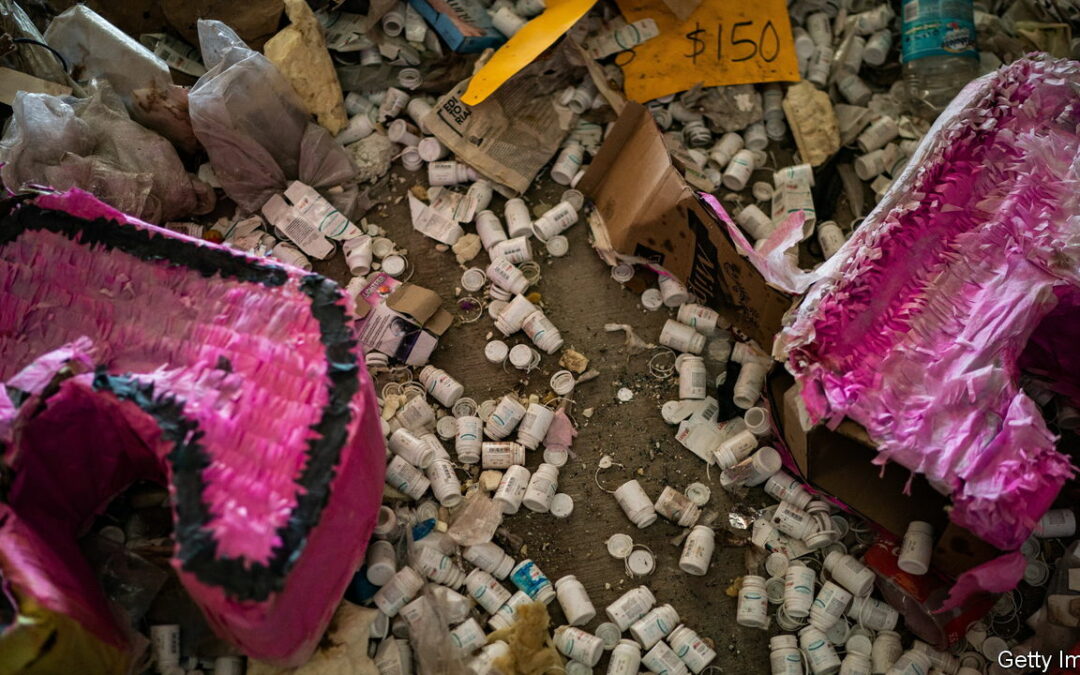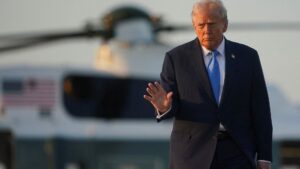MEXICANS ARE used to their country being used as a piñata during American election seasons. In 2015, in a speech to launch his presidential campaign, Donald Trump accused Mexico of sending drug-traffickers, rapists and other criminals to America and promised to make Mexico’s government pay for a wall along the border. His comments look almost friendly compared with the rhetoric this year. At the first Republican primary debate on August 23rd nearly all the candidates spoke in favour of bombing the laboratories of drug gangs south of the border, which make fentanyl, a synthetic opioid. Ron DeSantis, Florida’s governor, said he would send special forces into Mexico “on day one” in the (unlikely) event that he were to win the presidency. Why?
America is in the midst of an overdose epidemic. Since fentanyl started claiming lives in 2014, the drug has been the biggest killer of 18- to 45-year-old Americans. It is 50 times stronger than heroin. Some 70,000 Americans died from synthetic opioids in 2021—almost all of those deaths involved fentanyl, which is often mixed with other drugs. Most of the fentanyl they consumed is believed to come from south of the border. Drug gangs, predominantly the Sinaloa cartel based in the north-west of Mexico, import chemical precursors from China to cook into fentanyl in clandestine labs. Making fentanyl is a profitable business. America’s Drug Enforcement Administration (DEA) reckons it costs the Sinaloa cartel just ten cents to make a pill that they can then sell wholesale to dealers for 50.
Still, the clue to the hardening of Republican attitudes towards Mexico lies less in these facts than in politics. And, as with so much to do with the Republican Party, the source is Mr Trump. According to a memoir by Mark Esper, his former defence secretary, the then-president mused more than once during his term about firing missiles at Mexican cartels’ drug labs. (“No one would know it was us,” he supposedly said, unconvincingly.) Like many of Mr Trump’s ideas, the outlandish has become Republican mainstream as his contenders try to outdo him in hawkishness. It does not help that in 2020 Mexico’s president, Andrés Manuel López Obrador, limited the work of DEA agents in his country. More recently, he has claimed that no fentanyl is made (or consumed) in Mexico, despite overwhelming evidence to the contrary.
Despite the mendacious comments on both sides of the border, bilateral co-operation on fentanyl is going fairly well. In May Mexico passed tough legislation that increases controls on imports of chemicals that can be used to make fentanyl; this month it also signed up to a UN anti-trafficking programme. Though this is far from the heyday of collaboration between 2006 and 2012, in the past few years Mexican security forces have worked more closely with their American counterparts to cut off financing for drug bosses, arrest them and even kill them. In April American prosecutors indicted 28 people involved in the fentanyl trade, including members of the Sinaloa cartel. Bombing Mexico would almost certainly fail to deal with the problem, and would vandalise relations with America’s biggest trading partner. But that may not mean cool heads will prevail if Mr Trump were to win the presidency again. If split open, this piñata will not be full of sweet things.■









